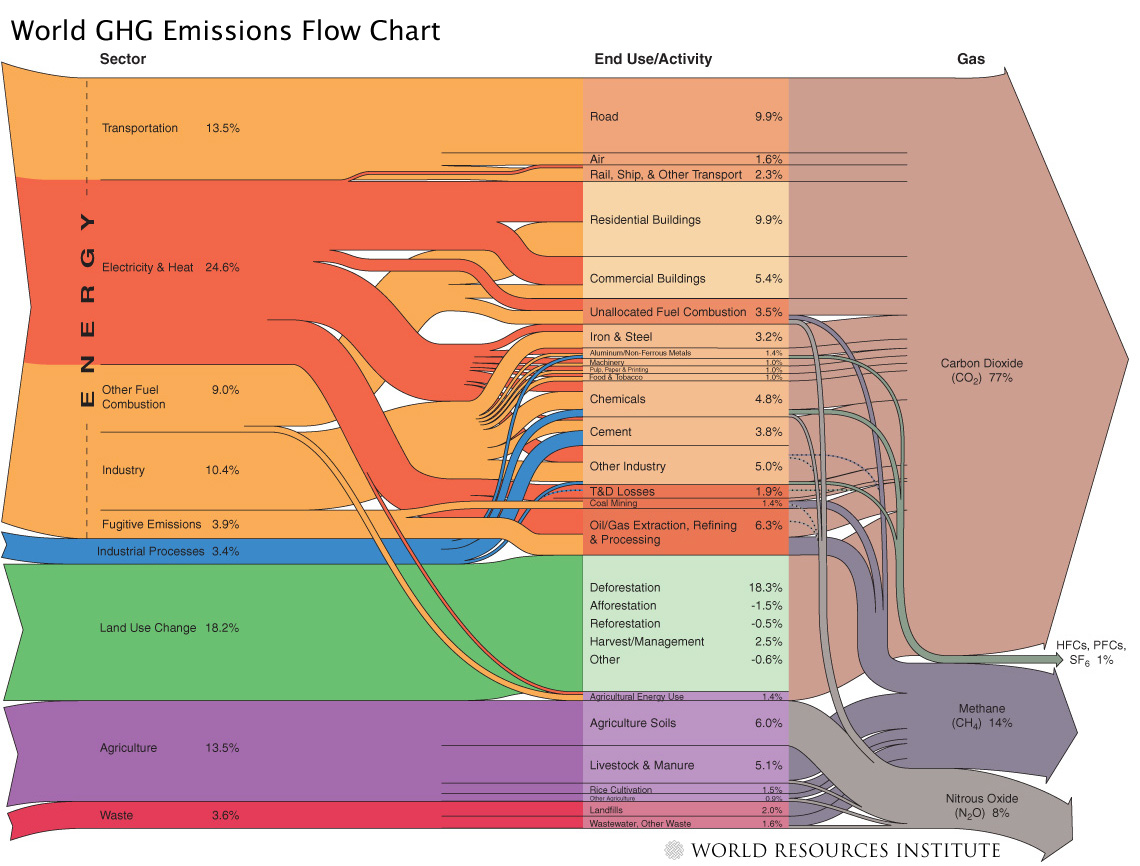
This is the new rebuttal to the myth 'animal agriculture and eating meat are the biggest causes of global warming.' It's available at the short URL sks.to/meat
The burning of fossil fuels for energy and animal agriculture are two of the biggest contributors to global warming, along with deforestation. Globally, fossil fuel-based energy is responsible for about 60% of human greenhouse gas emissions, with deforestation at about 18%, and animal agriculture between 14% and 18% (estimates from the World Resources Institute, UN Food and Agriculture Organization, and Pitesky et al. 2009).
Global human greenhouse gas emissions flowchart, from the World Resources Institute.
So, animal agriculture and meat consumption are significant contributors to global warming, but far less so than fossil fuel combustion. Moreover, fossil fuels are an even bigger contributor to the problem in developed countries, which use more energy and have increased livestock production efficiency (Pitesky et al. 2009). For example, in the United States, fossil fuel-based energy is responsible for about 80% of total greenhouse gasemissions as compared to about 6% from animal agriculture (estimates from the World Resources Institute and Pitesky et al. 2009).
US human greenhouse gas emissions flowchart, from the World Resources Institute.
On of the main ways in which the livestock sector contributes to global warming is throughdeforestation caused by expansion of pasture land and arable land used to grow feedcrops. Overall, animal agriculture is responsible for about 9% of human-caused carbon dioxideemissions globally (UN FAO).
Animal agriculture is also a significant source of other greenhouse gases. For example, ruminant animals like cattle produce methane, which is a greenhouse gas about 20 times more potent than carbon dioxide. The livestock sector is responsible for about 37% of human-caused methane emissions, and about 65% of human nitrous oxide emissions (mainly from manure), globally (UN FAO).
Producing beef requires significantly more resources (e.g. land, fertilizer, and water) than other sources of meat. As ruminant animals, cattle also produce methane that othersources (e.g. pigs and chickens) don't.
Eschel et al. 2014 estimated that producing beef requires 28 times more land, 6 times more fertilizer and 11 times more water than producing pork or chicken. As a result, the study estimated that producing beef releases 4 times more greenhouse gases than a calorie-equivalent amount of pork, and 5 times as much as an equivalent amount of poultry.
Eating vegetables produces lower greenhouse gas emissions yet. For example, potatoes, rice, and broccoli produce approximately 3–5 times lower emissions than an equivalent mass of poultry and pork (Environmental Working Group 2011). The reason is simple – it's more efficient to grow a crop and eat it than to grow a crop, feed it to an animal as it builds up muscle mass, then eat the animal.
Greenhouse gas lifecycle assessment for common proteins and vegetables (EWG 2011).
There are often suggestions that going vegan is the most important step people can take to solve the global warming problem. While reducing meat consumption (particularly beef and lamb) reduces greenhouse gas emissions, this claim is an exaggeration.
An oft-used comparison is that globally, animal agriculture is responsible for a larger proportion of human-caused greenhouse gas emissions (14-18%) than transportation (13.5%). While this is true, transportation is just one of the many sources of human fossil fuel combustion. Electricity and heat generation account for about 25% of global humangreenhouse gas emissions alone.
Moreover, in developed countries where the 'veganism will solve the problem' argument is most frequently made, animal agriculture is responsible for an even smaller share of the global warming problem than fossil fuels. For example, in the USA, fossil fuels are responsible for over 10 times more human-caused greenhouse gas emissions than animal agriculture.
That's not to minimize the significant global warming impact of animal agriculture (as well as its other adverse environmental impacts), especially from beef and lamb, but it's also important not to exaggerate its contribution or minimize the much larger contribution of fossil fuels.
Posted by dana1981 on Monday, 30 November, 2015
 |
The Skeptical Science website by Skeptical Science is licensed under a Creative Commons Attribution 3.0 Unported License. |